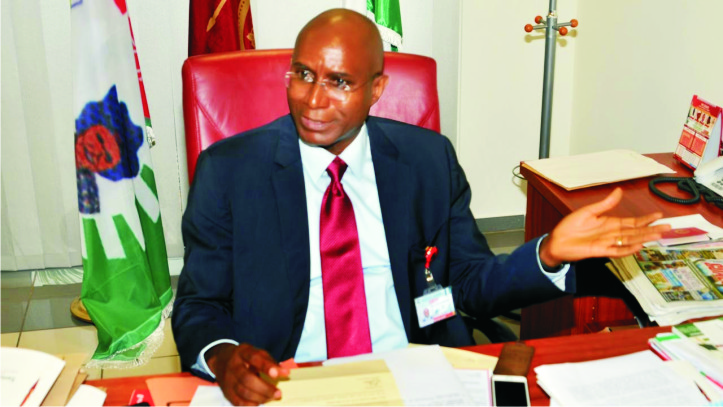Business
Omo-Agege Accuses Oil Producing Areas Of Diverting 13% Derivation Funds

The Deputy President of the Senate, Ovie Omo-Agege, has decried the diversion of the 13 percent oil derivation funds by oil-producing states.
Omo-Agege, according to a statement by his Special Adviser on Media and Publicity, Yomi Odunuga, made the remarks when he hosted a delegation of Oil and Gas Host Communities of Nigeria (HOSCON), led by the Amanyanabo of Twon-Brass in the Brass Kingdom and Chairman, Bayelsa State Traditional Rulers Council, Chief Alfred Diete-Spiff.
The Deputy Senate President specifically made a case for 100 percent utilisation of the derivation funds for oil-bearing communities, as against the practice where states release only 50 percent of the money to development commissions in their states.
The Delta Central lawmaker noted that since host communities bear the burden of environmental degradation from the oil industry, it is only fair that all funds be channeled into the development of the affected areas.
Omo-Agege, who chairs the Senate Adhoc Committee on Constitution Review, expressed regrets that the utilisation of the 13 percent derivation funds has become a political tool in the hands of state governors in the region.
He said the diversion of the money has contributed gravely to the underdevelopment of the region as the affected communities can hardly boast of having access to the basic necessities of life.
He said: “I have been discussing this matter with Chief (Wellington) Okrika even before I became a senator. It is fair that the 13 percent derivation is meant to ameliorate the conditions of the people who are most impacted by oil exploration and exploitation. That is the only reason this fund was set aside as a consequence of your agitation which you led for so many years.
“These funds are not meant for the state governments. The state governments are meant to be purveyors to host communities.
“Even in states that have development commissions, they only earmark 50 percent of the funds to the Commission to manage on behalf of the host communities.
“So what happens to the other 50 percent? We have always taken the position from the outset that 100 percent of the funds is meant for the development of host communities because it is not every area that suffers from oil exploration and degradation. But for some reason, it has become a political tool”.
Omo-Agege reiterated his call for gas flaring penalties in the Petroleum Industry Bill to be paid to the host communities and not to the Federation Account, stressing that the annual contribution of 2.5 percent actual operating expenditure by oil companies to the Host Community Development Trust Fund should be increased to, at least, five per cent.
He added that the penalties from gas flaring would be used to ameliorate the living conditions in Niger Delta communities, as they suffer from the environmental impact of oil exploration.
He called on the people in the region to show more than passing interest in the development of the area and hold their leaders accountable.
In his earlier remarks, the Senior Special Assistant to the President on Niger Delta Matters, Senator Ita Enang, called on the Senate Deputy President to intervene in the N98 billion gas flare fund, the controversy surrounding the Pipeline Surveillance Contract, 13 percent derivation payment to oil-producing communities and the need to pass a bill for the establishment of a Derivation Commission.
According to him, the Niger Delta people should be engaged in the surveillance contract to give them a sense of belonging.
He also lamented the absence of development commissions in Rivers, Bayelsa and Akwa Ibom States.
Business
Two Federal Agencies Enter Pack On Expansion, Sustainable Electricity In Niger Delta

Business
Why The AI Boom May Extend The Reign Of Natural Gas

Business
Ogun To Join Oil-Producing States ……..As NNPCL Kicks Off Commercial Oil Production At Eba

-

 Sports4 days ago
Sports4 days ago2026 WC: Nigeria, DR Congo Awaits FIFA Verdict Today
-
Politics4 days ago
ADC, PDP, LP Missing As INEC Set For By- Elections In Rivers
-

 Environment4 days ago
Environment4 days agoOxfam, partners celebrate 5 years of climate governance programmes in Nigeria
-
Politics4 days ago
FG’s Economic Policies Not Working – APC Chieftain
-

 Politics4 days ago
Politics4 days ago2027: Diri Unveils RHA LG Coordinators, APC Congress Panel
-

 Politics4 days ago
Politics4 days agoReps To Meet,’Morrow Over INEC’s 2027 Election Timetable
-

 Politics4 days ago
Politics4 days agoGroup Continues Push For Real Time Election Results Transmission
-
Sports4 days ago
Sunderland Overcome Oxford Challenge

